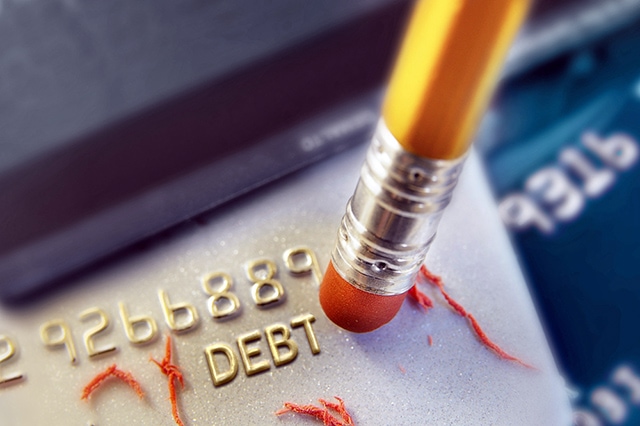There’s a longstanding myth that’s probably doing your money no favors: that carrying a balance on your credit card helps your credit score.
This myth favors paying off your balances slowly as opposed to paying them in full each month. And even if you aren’t struggling financially, it might be tempting to carry a small balance month to month, to free up a little extra spending money. But the reality is that doing so could get expensive, and it might damage your credit score over time.
Today, I’ll discuss what you should know about carrying a balance on your credit card versus paying it off in full each month, as well as how each action could impact your credit score.
The High Cost of Carrying a Credit Card Balance
If you’re wondering whether you should keep a small balance or make the full payment each month, paying off your monthly credit card balances is the better approach. You’ll typically be charged interest for carrying a balance, meaning your purchases will cost more than what you initially paid. And I don’t have to tell you: You don’t want to pay any more than you have to, especially with inflation still uncomfortably high.
While convenient and easy to use, credit cards come with high annual percentage rates (APRs), which can result in high interest charges. In fact, the average credit card APR currently sits at around 24%. Interest charges can get very expensive very quickly because credit card companies typically compound interest daily.
Related: 5 Best Credit Cards for Teens [Build Credit]
Why Did My Credit Score Go Down When I Paid Off My Credit Card Balance?
Paying off your balance usually won’t hurt your credit score. However, if you pay off a balance and then close the card, it might ding your score. That’s because closing a card can increase your credit utilization ratio, which is the amount you owe across all of your cards, divided by your total available credit. (It might also impact the age of your accounts, which we’ll discuss shortly.)
You typically want your utilization rate to be below 30%. If you close an account, that means you have less credit available to draw on, which increases your utilization rate.
Example
Here’s a quick example of how closing a card could cause your credit utilization to increase:
Let’s say I have three credit cards, each with limits of $5,000. I carry a $1,500 balance on the first card, $1,500 on the second card, and $1,000 on the third. I pay the third card off, then close the account. My total credit limit drops from $15,000 to $10,000, while my combined remaining balance falls from $4,000 to $3,000. My credit utilization ratio would actually increase, from 26.7% (the $4,000 in combined balances divided by my combined limit of $15,000) to 30% (the $3,000 in remaining balances divided by my new $10,000 combined credit limit). When the credit bureaus evaluate this new, higher ratio, my credit score might drop.
Not only can closing a card increase your credit utilization ratio—which accounts for 30% of your total FICO score—it can also impact the length of your credit history, which accounts for 15%.
I was lucky. Several years ago, I thought about closing my first credit card, and one of my colleagues gave me the same explanation I’ll give you:
Let’s say the card you close is the first credit card you ever opened, and you’ve had it for 20 years. This 20-year-old account is the oldest on your credit report. Closing it will decrease both the age of your oldest account and the average age of all your accounts, which could ding your credit scores. So even if you pay off a credit card’s balance, it’s best to keep the account open. This is true even if you won’t be using the credit card often.
Related: How to Get a Credit Card for the First Time: Starter Credit Cards
How Can a Credit Card Balance Impact Your Credit Scores?
Carrying a balance can have a detrimental impact on your credit scores, mainly because it can increase the amount of credit you’re using relative to your total limit. It can also harm your overall finances, especially if you’re faced with an unexpected expense.
Here are the various ways carrying a balance can impact your credit score:
It Increases Your Credit Utilization Ratio
Remember: The more available credit you use, the higher your credit utilization ratio will be. And a high ratio isn’t good for credit scores. This factor counts for 30% of your credit scoring because consumers who use a large amount of their available credit could be more likely to default or become overwhelmed by their debt than folks using a small amount of their available credit.
So in general, the lower your balances relative to your credit limit, the better it is for your credit scoring.
It Might Impact Your Ability to Repay Your Balance
The compounding interest charges that come with carrying a balance may eventually strain your ability to repay your credit card debt. And missed or late payments will negatively impact your FICO score in a big way, as your payment history is the most important factor, accounting for 35% of your total FICO score.
It Ties Up Your Credit Limit
Beyond hurting your credit score, carrying a balance also limits your spending power. If you need to use your card to cover a large, unexpected expense, you might not have the available credit to do so. Then you’d need to scramble to find the necessary funds, which could result in you taking out an expensive loan.
Should I Leave a Small Balance on My Credit Card?
The short answer is no. Even if you aren’t using a large amount of your credit limit, leaving a small balance on your card probably won’t work in your favor. Doing so could be detrimental for a couple of reasons.
Credit Card Debt Is Expensive
As mentioned above, the average APR on credit cards is around 24%. While that percentage is fairly high on its own, it’s much higher than what you’d see with other types of unsecured debt. For instance, if you have a 785 credit score, which is considered excellent credit, you might be able to get a personal loan with a fixed APR in single digits.
Compounding Interest Charges Work Against You
Not only do credit cards come with high interest rates, but credit card companies often compound that interest daily. This means your issuer will charge you interest on your average balance each day, which can rack up interest very quickly. Although these costs could be manageable initially, they might not stay that way for long. Over time, high-interest debt can get very expensive.
Related: Best Compound Interest Investments and Accounts
Why You Shouldn’t Carry a Credit Card Balance At All
In fact, carrying any balance generally isn’t a good idea. Not only does it cost you a lot of interest and possibly negate the value of any card rewards you’re earning, it can also lower your credit score.
It Doesn’t Build Credit
First, carrying a balance won’t help you improve your credit score. In fact, doing so could hurt your credit score. As your balance increases over time with compounding interest, your credit utilization rate will increase along with it. And a higher utilization rate can result in a lower credit score.
It Doesn’t Earn Extra Rewards Points or Cash Back
Besides being a convenient spending tool, many credit cards let you earn rewards points, miles, or cash back from your regular spending. But you probably won’t earn rewards on interest charges. Credit card issuers have pretty strict rules in place that prevent you from doing so. Plus, paying extra interest can easily wipe out the value of the rewards you’ve earned, such as cash back or travel rewards points for an upcoming trip.
It Limits Your Available Credit in Emergencies
Tying up your credit by carrying a balance can be dangerous. If an unexpected cost crops up and you don’t have enough cash or a high enough credit limit to cover it, you’ll need to find an alternative funding source quickly. This isn’t always easy to do, and you could end up in a situation where you need to take out a payday loan with an astronomical interest rate to cover the expense. That will cost you even more in interest payments, and if you don’t pay off the loan quickly, your credit score could sink.
It Costs You Money
As mentioned above, high-interest debt can be expensive. If you’re paying off your entire balance each month, you’ll avoid paying interest charges. But if you aren’t, those charges can snowball quickly. Once they do, this could undermine your ability to consistently manage debt, which isn’t a good place to be.
Related: Is No Credit Better Than Bad Credit?
FAQs About Credit Card Balances
How soon should you pay off your credit card balance?
It’s good practice to pay off your statement balance in full at the end of each billing cycle. Billing cycles can vary from 28 to 31 days, depending on the credit card issuer. But in general, paying your credit card bill in full once per month is ideal. If you prefer, you can make payments twice per month to pay off the balance in smaller chunks. Doing so is unlikely to have a negative impact on your credit score.
Should you pay off your credit card after every purchase?
Paying your balance in full each month is great, but I can tell you that it’s overkill by paying off each purchase you make. It’s unlikely to help your credit score compared with paying off your balance in full monthly. Not to mention, making payments in this way could become a real hassle if you use your credit cards frequently. You could end up making a credit card payment every day or multiple times per day.
What happens if you overpay your credit card balance?
If you accidentally overpay your card balance, don’t worry: You’ll likely just see a negative balance when you log in to view your account. But while this negative balance could give you a head start on the next billing cycle, it’s best to avoid overpaying. Keeping that money accessible in your bank account, where it’s available if you need it and can earn you some interest, is the better option. Plus, do you really want to give your credit card issuer a no-interest loan?
Should you switch your balance from one card to another?
Switching over your balance from one card to another, in and of itself, isn’t going to do anything to immediately help your credit score. That’s because if you just switch your balance from one existing card to another, your credit utilization ratio will remain the same.
However, if you’re paying a high interest rate on a large balance, and another one of your existing credit cards offers you a balance transfer promotion with, say, 0% interest for a certain number of months, a balance transfer could help you pay off that balance more quickly, and thus improve your credit score over time. Also, if you seek out balance transfer credit cards with no- or low-interest promotions, and successfully open one, not only will you achieve savings on interest—your total credit available will increase, which could help reduce your credit utilization ratio.
Does it hurt your credit score if you don’t use your credit card?
On its own, not using a credit card won’t hurt your credit score. You’re not increasing your credit utilization or over-extending yourself financially, which are both good things from a credit score standpoint.
But if you don’t use a credit card for a prolonged period, you run the risk of the card issuer canceling your account. Inactivity is a common reason credit card companies close accounts. And if the card that’s closed is your oldest account, your credit score could take a hit. Remember, the length of your account history factors into your FICO score, so decreasing that length could hurt your credit.










![Top 7 Free Debit Cards for Minors [Kids + Teens] 11 best debit cards for teens hires](https://wealthup.com/wp-content/uploads/best-debit-cards-for-teens-hires-600x403.webp)

